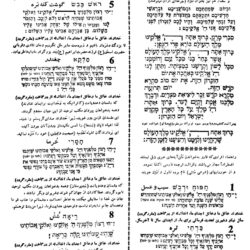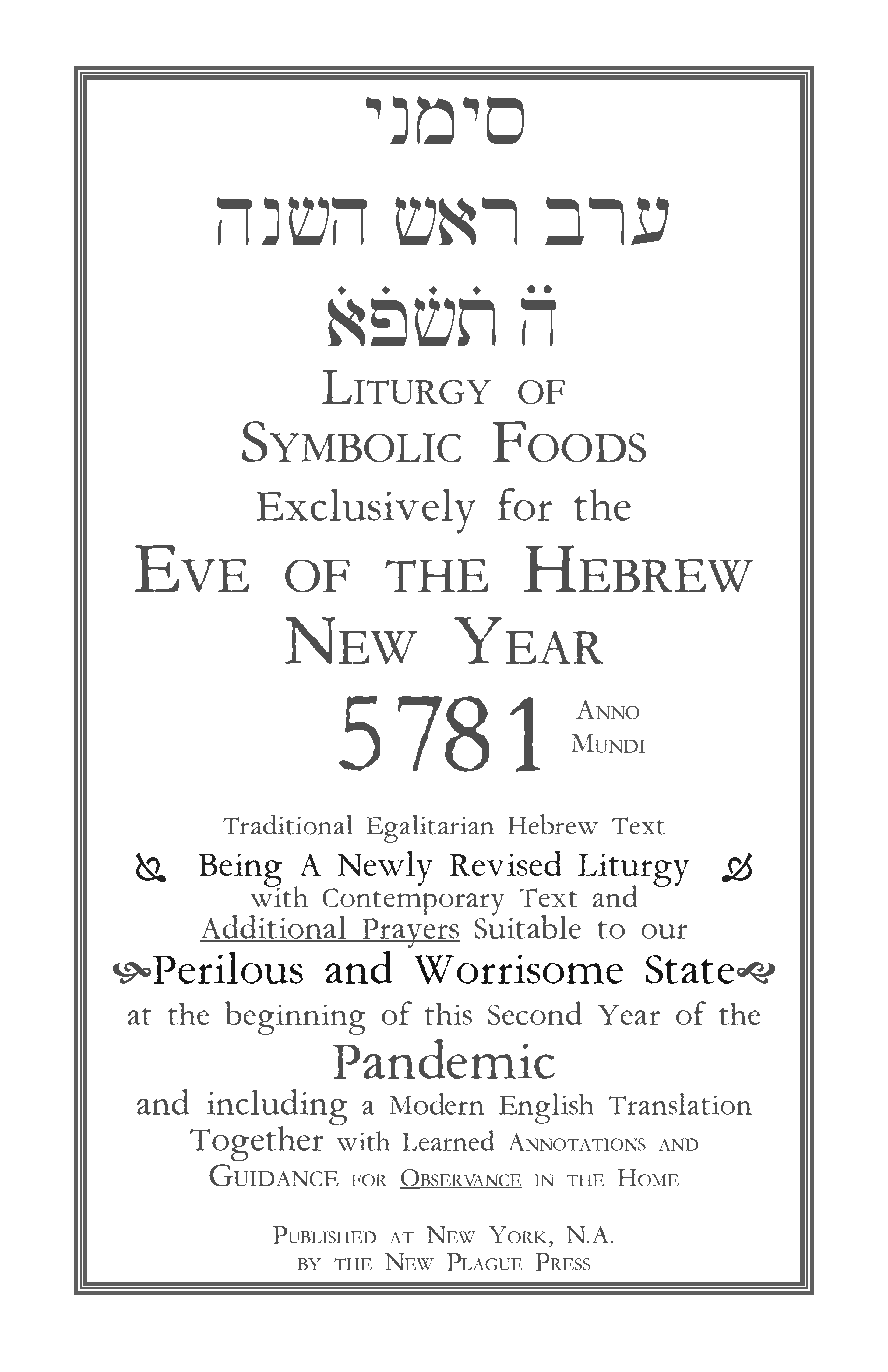| Source (Hebrew) | Translation (English) |
|---|---|
1 תַּפּוּחַ וּדְבַשׁ יְהִי רָצוֹן מִלְּפָנֶיךָ הָ׳ אֱלֹקֵינוּ וֵאלֹקֵי אֲבוֹתֵֽינוּ שֶׁתִּתְחַדֵּשׁ עָלֵינוּ שָׁנָה טוֹבָה וּמְתוּקָה׃ (כי היא הנקרא שבת ביסוד) מֵרֵאשֻׁית הַשָּׁנָה וְעַד אַחֲרִית הַשָּׁנָה׃ |
1 Tapuaḥ, Apple in Honey May it be your will, our God and God of our ancestors, to renew for us a year sweet as honey, from the beginning of the year to the end of the year. |
2 כַּרְתִּי יְהִי רָצוֹן מִלְּפָנֶיךָ הָ׳ אֱלֹקֵינוּ וֵאלֹקֵי אֲבוֹתֵֽינוּ שֶׁיִכָּרְתוּ אוֹיְבֶיךָ וְשׂוֹנְאֶיךָ וְכָל מְבַקְשֵׁי רָעָתֵנוּ׃ (ואחר כך יאמר) תָּרוּם יָדְךָ עַל צָרֶיךָ וְכָל אוֹיְבֶיךָ יִכָּרְתוּ׃ (מיכה ה:ח) |
2 Kartei, Leeks[1] Cf. Abayyé in Talmud Bavli, Horayot 12a May it be your will, our God and God of our ancestors, to cut off our enemies and all who seek to trouble us. (Afterward say:) “Your hand shall prevail over your foes, And all your enemies shall be cut down!”[2] Micah 5:8 |
3 קְרָא יְהִי רָצוֹן מִלְּפָנֶיךָ הָ׳ אֱלֹקֵינוּ וֵאלֹקֵי אֲבוֹתֵֽינוּ שֶׁתִּקְרַע רוֹעַ גְּזַר דִּינֵנוּ וְיִקָּרְאוּ לְפָנֶיךָ זָכִיּוֹתֵינוּ׃ | |
4 רוּבִיָא יְהִי רָצוֹן מִלְּפָנֶיךָ הָ׳ אֱלֹקֵינוּ וֵאלֹקֵי אֲבוֹתֵֽינוּ שֶׁיִרְבּוּ זָכִיּוֹתֵינוּ וּתְלַבְּבֵנוּ׃ | |
5 רֹאשׁ כֶּבֶשׂ יְהִי רָצוֹן מִלְּפָנֶיךָ הָ׳ אֱלֹקֵינוּ וֵאלֹקֵי אֲבוֹתֵֽינוּ שֶׁנִּהְיֶה לְרֹאשׁ וְלֹא לְזָנָב. וְתִזְכֹּר לָנוּ (עֲקֵדָתוֹ וְ)אֵילוֹ שֶׁל יִצְחָק אָבִינוּ עָלָיו הַשָּׁלוֹם. בֶּן אַבְרָהָם אָבִינוּ עָלָיו הַשָּׁלוֹם׃ |
5 Rosh Kevish, Sheep’s head May it be your will, our God and God of our ancestors, that we will be as the head and not as the tail. And remember for us the Akeda of Isaac, our ancestor, peace be upon them son of Abraham our ancestor, peace be upon them. |
6 סַלְקָא יְהִי רָצוֹן מִלְּפָנֶיךָ הָ׳ אֱלֹקֵינוּ וֵאלֹקֵי אֲבוֹתֵֽינוּ שֶׁיִּסְתַּלְּקוּ אוֹיְבֶיךָ וְשׂוֹנְאֶיךָ וְכָל מְבַקְשֵׁי רָעָתֵנוּ׃ (ואחר כך יאמר) סוּרוּ מִמֶּנִּי כָּל פֹּעֲלֵי אָוֶן כִּי שָׁמַע הָ׳ קוֹל בִּכְיִי׃ (תהלים ו:ט) סוּרוּ סוּרוּ צְאוּ מִשָּׁם טָמֵא אַל תִּגְּעוּ צְאוּ מִתּוֹכָהּ הִבָּרוּ נֹשְׂאֵי כְּלֵי הָ׳׃ (ישעיהו נב:יא) |
6 Salka, Beets[5] Ibid. May it be your will, our God and God of our ancestors, that our enemies and detractors disappear along with all who seek to trouble us. (Afterward say:) “Away from me, all you evildoers, for Hashem heeds the sound of my weeping.”[6] Psalms 6:9 “Turn, turn away, touch nothing impure as you depart from there; Keep pure, as you go forth from there, you who bear the vessels of Hashem!”[7] Isaiah 52:11 |
7 תָּמָרִי יְהִי רָצוֹן מִלְּפָנֶיךָ הָ׳ אֱלֹקֵינוּ וֵאלֹקֵי אֲבוֹתֵֽינוּ שֶׁיִּתַּמּוּ אוֹיְבֶיךָ וְשׂוֹנְאֶיךָ וְכָל מְבַקְשֵׁי רָעָתֵנוּ׃ (ואחר כך יאמר) יִתַּמּוּ חַטָּאִים מִן הָאָרֶץ וּרְשָׁעִים עוֹד אֵינָם בָּרְכִי נַפְשִׁי אֶת הָ׳׃ (תהלים קד:לה) וּבְחַסְדְּךָ תַּצְמִית אוֹיְבַי וְהַאֲבַדְתָּ כָּל צוֹרְרֵי נַפְשִׁי כִּי אֲנִי עַבְדֶּךָ׃ (תהלים קמג:יב) |
7 Tamar, dates[8] Ibid. May it be your will, our God and God of our ancestors, that our enemies and detractors will cease along with all who seek to trouble us. (Afterward say:) “May sinners disappear from the earth, and the wicked be no more. Bless Hashem, O my soul. Hallelu-Yah.”[9] Psalms 104:35 “As You are faithful, put an end to my foes; destroy all my mortal enemies, for I am your servant.”[10] Psalms 143:12 |
8 רֵיאָה יְהִי רָצוֹן מִלְּפָנֶיךָ הָ׳ אֱלֹקֵינוּ וֵאלֹקֵי אֲבוֹתֵֽינוּ שֶׁיִּהְיוּ עַוֺּנוֹתֵינוּ קַלָה כְּרֵיאָה׃ |
8 Raya, lungs[11] Nili Simhai substitutes meringue in place of lungs. (“Also, those ladyfinger cookies that kind of taste like kichel”). Light and airy is the key — to retain the symbolic association with lungs. May it be your will, our God and God of our ancestors, that our sins be as light as the lungs. |
9 רִמוֹן יְהִי רָצוֹן מִלְּפָנֶיךָ הָ׳ אֱלֹקֵינוּ וֵאלֹקֵי אֲבוֹתֵֽינוּ. שֶׁנִּהְיֶה מְלֵאִים מִצְוֺת כָּרִמּוֹן׃ |
9 Rimon, Pomegranate May it be your will, our God and God of our ancestors, that we be full of mitsvot like a pomegranate. |
Sol’e nu Mobarak! سال نو مبارک — L’shanah Tova לשנה טובה!
Thank you to Nili Simhai for sharing the Farsi (Persian) Nusaḥ of this punful minhag — the order of eating auspicious foods and reading associated supplications for a blessed New Year during the festive meals of Rosh Hashanah. Profound thanks are also due to Rabbi Simcha Daniel Burstyn of Kibbutz Lotan for his translation.
If you can read Persian, please help to transcribe all of the Persian translations provided in the sourcetext image of this seder.
Thank you to Nili Simhai and Yosh Schulman for sharing the Farsi (Persian) Nusaḥ of this punful minhag — the order of reciting kavvanot (intentions) for the New Year. Profound thanks are also due to Rabbi Simcha Daniel Burstyn of Kibbutz Lotan for his translation. Please help the Open Siddur Project by helping to translate and transcribe all of the Hebrew and Farsi in this seder. Sol’e nu Mobarak!
Source

Seder Ahilat haSimanim – Rosh haShanah (Farsi) – from the collection of Nili Simhai and Yosh Schulman
Notes
| 1 | Cf. Abayyé in Talmud Bavli, Horayot 12a |
|---|---|
| 2 | Micah 5:8 |
| 3 | Ibid. |
| 4 | Ibid. |
| 5 | Ibid. |
| 6 | Psalms 6:9 |
| 7 | Isaiah 52:11 |
| 8 | Ibid. |
| 9 | Psalms 104:35 |
| 10 | Psalms 143:12 |
| 11 | Nili Simhai substitutes meringue in place of lungs. (“Also, those ladyfinger cookies that kind of taste like kichel”). Light and airy is the key — to retain the symbolic association with lungs. |

“📖 סדר אכילת הסמנים | The Seder of Auspicious Foods for the Feast of Rosh Hashanah according to the Persian custom” is shared through the Open Siddur Project with a Creative Commons Attribution-ShareAlike 4.0 International copyleft license.










Here’s the section of the *Hebrew* food puns transcribed. I don’t know Farsi, so I can’t keyboard it. The kiddush should be relatively easy to find as well. There are probably some typos both in the transcription and in the pointing of the source document.
יְהִי רָצוֹן מִלְּפָנֶיךָ הָ׳ אֱלֹקֵינוּ וֵאלֹקֵי אֲבוֹתֵֽינוּ שֶׁתִּתְחַדֵּשׁ עָלֵינוּ שָׁנָה טוֹבָה וּמְתוּקָה׃ (כי היא הנקרא שבת ביסוד) מֵרֵאשֻׁית הַשָּׁנָה וְעַד אַחֲרִית הַשָּׁנָה׃
2 כַּרְתִּי
יְהִי רָצוֹן מִלְּפָנֶיךָ הָ׳ אֱלֹקֵינוּ וֵאלֹקֵי אֲבוֹתֵֽינוּ שֶׁיִכָּרְתוּ אוֹיְבֶיךָ וְשׂוֹנְאֶיךָ וְכָל מְבַקְשֵׁי רָעָתֵנוּ׃ (ואחר כך יאמר) תָָּרוּם יָדְךָ עַל צָרֶיךָ וְכָל אוֹיְבֶיךָ יִכָּרְתוּ׃
3 קְרָא
יְהִי רָצוֹן מִלְּפָנֶיךָ הָ׳ אֱלֹקֵינוּ וֵאלֹקֵי אֲבוֹתֵֽינוּ שֶׁתִּקְרַע רוֹעַ גְּזַר דִּינֵנוּ וְיִקָּרְאוּ לְפָנֶיךָ זָכִיּוֹתֵינוּ׃
4 רוּבִיָא
יְהִי רָצוֹן מִלְּפָנֶיךָ הָ׳ אֱלֹקֵינוּ וֵאלֹקֵי אֲבוֹתֵֽינוּ שֶׁיִרְבּוּ זָכִיּוֹתֵינוּ וּתְלַבְּבֵנוּ׃
5 רֹאשׁ כֶּבֶשׂ
יְהִי רָצוֹן מִלְּפָנֶיךָ הָ׳ אֱלֹקֵינוּ וֵאלֹקֵי אֲבוֹתֵֽינוּ שֶׁנִּהְיֶה לְרֹאשׁ וְלֹא לְזָנָב. וְתִזְכֹּר לָנוּ (עֲקֵדָתוֹ וְ)אֵילוֹ שֶׁל יִצְחָק אָבִינוּ עָלָיו הַשָּׁלוֹם. בֶּן אַבְרָהָם אָבִינוּ עָלָיו הַשָּׁלוֹם׃
6 סַלְקָא
יְהִי רָצוֹן מִלְּפָנֶיךָ הָ׳ אֱלֹקֵינוּ וֵאלֹקֵי אֲבוֹתֵֽינוּ שֶׁיִּסְתַּלְּקוּ אוֹיְבֶיךָ וְשׂוֹנְאֶיךָ וְכָל מְבַקְשֵׁי רָעָתֵנוּ׃ (ואחר כך יאמר) סוּרוּ מִמֶּנִּי כָּל פֹּעֲלֵי אָוֶן כִּי שָׁמַע הָ׳ קוֹל בִּכְיִי׃ סוּרוּ סוּרוּ צְאוּ מִשָּׁם טָמֵא אַל תִּגְּעוּ צְאוּ מִתּוֹכָהּ הִבָּרוּ נֹשְׂאֵי כְּלֵי הָ׳׃
7 תָּמָרִי
יְהִי רָצוֹן מִלְּפָנֶיךָ הָ׳ אֱלֹקֵינוּ וֵאלֹקֵי אֲבוֹתֵֽינוּ שֶׁיִּתַּמּוּ אוֹיְבֶיךָ וְשׂוֹנְאֶיךָ וְכָל מְבַקְשֵׁי רָעָתֵנוּ׃ (ואחר כך יאמר) יִתַּמּוּ חַטָּאִים מִן הָאָרֶץ וּרְשָׁעִים עוֹד אֵינָם בָּרְכִי נַפְשִׁי אֶת הָ׳׃ וּבְחַסְדְּךַ תַּצְמִית אוֹיְבַי וְהַאֲבַדְתָּ כָּל צוֹרְרֵי נַפְשִׁי כִּי אֲנִי עַבְדֶּךָ׃
8 רֵיאָה
יְהִי רָצוֹן מִלְּפָנֶיךָ הָ׳ אֱלֹקֵינוּ וֵאלֹקֵי אֲבוֹתֵֽינוּ שֶׁיִּהְיוּ עַוֺּנוֹתֵינוּ קַלָה כְּרֵיאָה׃
9 רִמוֹן
יְהִי רָצוֹן מִלְּפָנֶיךָ הָ׳ אֱלֹקֵינוּ וֵאלֹקֵי אֲבוֹתֵֽינוּ. שֶׁנִּהְיֶה מְלֵאִים מִצְוֺת כָּרִמּוֹן׃
Amazing Efraim! Also, most of the puns are lost on me (because I don’t recognize most of the food items and milon.co.il and translate.google.com are of little help).
Shir – I think this year I recognized for the first time that many of the puns are from the Aramaic. “Rubia” for example, is the Aramaic word for beans, not the Hebrew for beans. So, when it says “sheyirboo” in the intention for beans, that’s the pun. When we had our seder this year, with a lot of Isabella Freedman chevre around, we started to make our own puns – that our enemies should be “beet’ or “squashed,” for example. And one person said that in her family, after they do all the traditional ones, they also pass out raisins and celery, for a “raise in salary.” : )
Thank you for the seder!
Here is a short essay I wrote about the negative nature of some of these blessings and some new suggestions:
http://www.bac.org.il/ContentPage.aspx?id=1897
Shana tova
Dalia
Did you just type that up? That is awesome, Efraim.
A quick translation:
1 Apple in Honey
May it be your will, our God and God of our ancestors, to renew for us a year sweet as honey, from the beginning of the year to the end of the year.
2 Kartei = Leeks
May it be your will, our God and God of our ancestors, to cut off our enemies and all who seek to trouble us.
3 Kara = Zucchini
May it be your will, our God and God of our ancestors, to tear up the evil decrees against us and declare our righteousness.
4 Rubia (broad beans?)
May it be your will, our God and God of our ancestors, that our righteousness will multiply and that you will love us.
5 Sheep head
May it be your will, our God and God of our ancestors, that we will be as the head and not as the tail. And remember for us the Akeda of Isaac son of Abraham our ancestors, peace be upon them.
6 Salka = Beets
May it be your will, our God and God of our ancestors, that our enemies and detractors disappear along with all who seek to trouble us.
7 Tamar = dates
May it be your will, our God and God of our ancestors, that our enemies and detractors will cease along with all who seek to trouble us.
8 Raya = aroma
May it be your will, our God and God of our ancestors, that our sins be as light as an aroma
9 Rimon = Pomegranate
May it be your will, our God and God of our ancestors, that we be full of mitzvot like a pomegranate.
Reyah, in the farsi, is not aroma, but lungs. Yes, traditionally, they would eat lungs at the seder. Which you can imagine are very light and airy, as we are asking our sins to be. Usually we just say that one and don’t eat anything. One year, my Ashkenazi husband made meringue and we used that instead of lungs. Also, usually, tongue is eaten to represent “head of sheep.”
Check this guest post by Leor Jacobi at the always excellent On the Main Line blog, for an expert take on the diverse meanings of Rubia in Jewish history. (In Artscroll’s maḥzor for Rosh Hashana, for Rubya they have “fenugreek, or carrots”!)
Thanks for the reference! That article was originally intended as a sidebar for an article which ran in Mishpacha magazine. http://dl.dropbox.com/u/24840282/simanim.pdf Thanks also for posting here a very interesting Persian liturgy. Am I correct in understanding that it was published only a few years ago in 5765?. Interesting how the nusah for the Rimon here differs from the standard, more original one. I’d guess that it represents an attempt to distinguish it from the similar nusah for the rubia.
Funny to be commenting on this at Passover time, but I have to say, that was one heck of an article on Rubia. I learned so much!
Thank you Thank you Thank you!!! This was an amazing and perfect addition to our seder.
You’re so very welcome, Debra! Wishing you meaningful and delightful se’udei rosh hashanah (rosh hashanah feasts).
Gonna need so many leeks this year …
Great Work, Nili! We have been using our tattered original Farsi copy imported to Pardes Hana from Tehrangles for years! Finally this year, Tuvia and I agreed it’s time we recreate & translate the original. Glad you beat us to it! Thanks for sharing access to this beautiful piece of our heritage. I’ve already sent to all our family and everyone is grateful for it. Tizku l’shanim rabot!
Moadim L’Shalom, Panteha-jan! So glad you searched and found it. Big thanks to Aharon for insisting he needed to borrow it when he saw my tattered copy. Sad sal be salhayeh khoob!